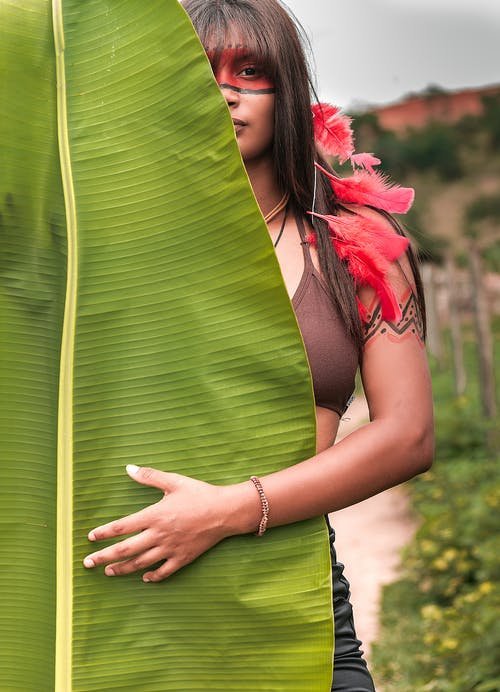A student has invented tampons made from banana leaves. Will they help women get through their period?

Tampons of various sizes, sanitary pads with or without wings, thicker or ultra-thin panty liners, menstrual cups made of hypo-allergenic materials, or perhaps panties absorbing menstrual blood? We, Polish women, have access to a wide range of menstrual products. Unfortunately, according to the shocking report “A Bloody Problem: Period poverty, why we need to end it and how to do it” by the Kulczyk Foundation and Founders Pledge, every fifth woman in Poland sometimes does not have the funds to buy appropriate sanitary pads.
So there are women for whom their period is – apart from painful abdominal cramps, uncomfortable PMS or a drop in mood – a monthly trauma caused by the inability to take care of their menstrual health.
That’s as many as 500 million women
Other countries, for example Brazil – paradoxically the most economically powerful among South America’s countries and the ninth in the world – offers scraps of paper, plastic bags or scraps of fabrics to the women born there. And not because hygiene products have not reached a country that is only slightly smaller than Europe. Several million Brazilian women cannot afford tampons, sanitary pads or panty liners. There are nearly 500 million women around the world who cannot take proper care of their hygiene during their period. 500 million!
A student of the Brazilian Federal University of Parana in Curitiba, Rafaella de Bona Gonçalves started studying the phenomenon of period poverty a few years ago. Interest in this difficult subject was the aftermath of passing a course offered by the university. As part of it, students had to choose one of the seventeen United Nations Sustainable Development Goals and design a tool to implement their idea. What interested the young Brazilian? Walking in the streets of Curitiba, the girl met homeless women many times. She – healthy, well-groomed, educated – passed her dirty, living in extreme conditions, often raped peers. “It was a shock to me. I looked at these women and wondered: how do they handle menstruation? Do they have access to hygiene products? I, a person who gets my period every month, couldn’t imagine what they had to go through,” recalls de Bona Gonçalves in Intelligent Living.
“Maria” tampons for each of us
Terrified by the observations, the student decided to come up with a product that would be available to women living on the Brazilian streets, easy to apply and, very importantly, biodegradable. Care for the environment was and is also included in de Bona Gonçalves’s academic activity. After watching the Oscar-winning documentary “Absorbing of Taboo” about Indian women experiencing extreme period poverty, and an online video of a woman who made a tampon from the inside of a sanitary pad, the girl devised her own design, friendly both for women and the environment. She created modern tampons from banana leaf fibres, which in her opinion is an excellent and environmentally-friendly material for production. She named the invention after the most popular female name in Brazil, “Maria,” to reassure Brazilian women that the hygiene products she invented are for everyone.
Tear it off, roll it up and put it in
A pack of banana tampons resembles a roll of toilet paper. Their application is very simple – just tear one leaf off and roll it up. These can be smaller or larger – it all depends on the intensity of menstruation and the woman’s comfort.
Among scientists and doctors, “Maria” has received so many recommendations that the Brazilian government decided to make it available free of charge and to engage in the production of banana tampons. The student’s idea was also appreciated abroad, specifically in Germany, where de Bona Gonçalves was awarded the prestigious “iF Design Talent Award”. “The news about the award makes me very happy, especially as it was granted to a social project that touches on issues that are usually overlooked,” commented the student.
Pink Boxes? Men: This is an unnecessary expense
It is strange that the Germans did not go with the punch and did not take care of the proper promotion of an invention for women invented by a woman. Instead, they preferred to show off a gadget created by men – Pinky Gloves, i.e., pink “menstrual gloves” thanks to which menstrual blood will disappear as if by magic or pretend that it is not there at all. In Poland, we can also forget about banana tampons. Not to mention free access to hygiene products, as in Scotland. Yes, Polish women can use so-called Pink Boxes, but so far there are few of them. In Krakow, where over 780,000 people live, and more than half of them are women, there are just... seven boxes. Shame! When the city announced that it would soon install two hundred new ones, true Polish men, brave warriors, those most affected by menstruation, announced to everyone that it was an unnecessary expense.
The path to a world in which women will have the right to decide about their bodies and the right to hygiene is still a long and winding one. But – thanks to the idea of a Brazilian student – we are at least on the right track.

